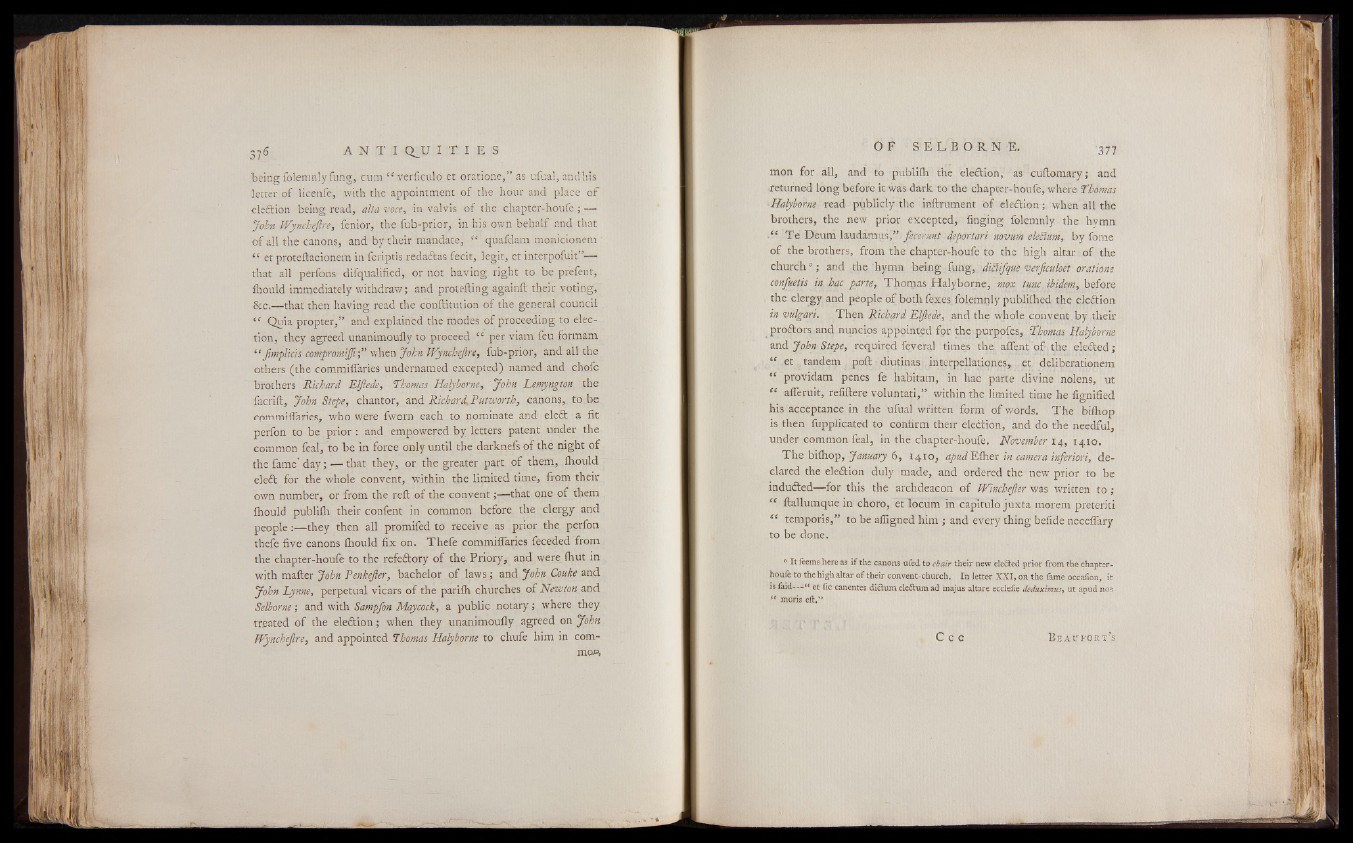
being folemnly fung, cum “ verficulo et oratione,” as .ufual, and his
letter of licenfe, with the appointment of the hour and place o f
election being read, alta voce, in valvis of the chapter-houfe ; —
John Wymhejlre, fenior, the fub-prior, in his own behalf and that
of all the canons, and by their mandate, “ quafdam monicionem
“ et proteftacionem in fcriptis redaftas fecit, legit, et interpofuit”—
that all perfons difqualified, or not having right to be prefent,
fhould immediately withdraw; and protefting againft their voting,
&c.— that then having read the conftitution of the general council
j j Quia propter,” and explained the modes of proceeding to election,
they agreed unanimoully to proceed “ per viam feu formam
“ Jtmplicis compromijfi;” when John Wynchejlre, fub-prior, and all the
others (the commifiaries undernamed excepted) named and chofe
brothers Richard EIJiede, 'Thomas Halyborne, John Lemyngton the
facrift, John Stepe, chantor, and Richard,Putworth, canons, to.be
commifiaries, who were fworn each to nominate and eleft a fit
perfon to be prior : and empowered by letters patent under the
common feal, to be in force only until the darknefs of the night of
the fame'day;— that they, or the greater part of them, fhould
elefl for the whole convent, within the limited time, from their
own number, or from the reft of the convent;— that one of them
fhould publifh their confent in common before the clergy and
people:— they then all promifed to receive as prior the perfon
thefe five canons fhould fix on. Thefe commifiaries feceded from
the chapter-houfe to the refeftory of the Priory, and were fhut in
with matter John Penkefter, bachelor of laws; and John Couke and
John Lynne, perpetual vicars of the parilh churches of Newton and
Selborne; and with Sampfon Maycock, a public notary; where they
treated of the eleftion; when they unanimoully agreed on John
Wynchejire, and appointed Thomas Halyborne to chufe him in common
for all, and to publifh thé eleftion, as cuftomary; and
returned long before it was dark to the chapter-houfe, where Thomas
Halyborne read publicly the inftrument of eleftion; when all the
brothers, the new prior excepted, finging folemnly the hymn
“ Te Deum lanittmus,” -fecerunt deportari novum eletdum, by forne
of the brothers, from the chapter-houfe to the high altar, of the
church0; and the hymn being fung, diSlifque verficuloet oratione
confuetis in hac parte, Thomas Halyborne, mox tunc, ibidem, before
the clergy and people of both fexes. folemnly publifhed the eleftion
in vulgari. Then Richard EIJiede, and the whole convent by their
proftors and nuncios appointed for the purpofes, Thomas Halyborne
and John Stepe, required feveral times the affent of-the elefted;
“ et ..tandem poft • diutinas , interpellationes, . et. deliherationem
“ providam penes fe habitam, in hac parte divine nolens, ut
“ afieruit, refiftere voluntati,” within the limited time he fignified
his acceptance in the ufual written form of words. The bifhop
is then fupplicated to confirm their eleftion, and do the needful,
under common feal, in the chapter-houfe. November 14,1410.
The bifhop, January 6, 1410, apudESnzt in camera inferiori, declared
the eleftion duly made, and ordered the new prior to be
indufted— for this the archdeacon of Winchejler was written to ;
“ ftallumque in choro, et locum in capltulo juxta morem preteriti
“ temporis,” to be afligned him ; and every thing befide neceflary
to be done.
0 I t teems here as i f the canons ufed to chair their new elefted prior from the chapter-
houfe to the high altar o f their convent-church. In letter X X I, on the fame occafion, it
is laid— “ et lie canentes dictum eleftum ad majus altare ecclelie deduximus, ut apud nos
“ moris eft,”
C C C B e a u f o r t ’s